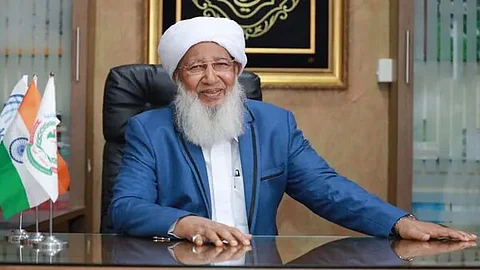

Nimisha Priya, a nurse from Kerala, has been on death row in Yemen since 2017 for the murder of her Yemeni business partner. The case drew national and international attention, especially as Priya's family and supporters launched desperate appeals for help. Her execution was reportedly imminent, triggering urgent efforts from human rights activists and civil society groups in India to intervene.
However, India’s limited diplomatic presence in war-torn Yemen posed a serious challenge. The legal system in Yemen, based on Sharia law, grants the victim’s family the right to pardon the convict in exchange for “diyya” or blood money. This opened a narrow but critical opportunity for negotiation—but required someone with deep cultural and religious standing to initiate dialogue with Yemeni stakeholders. That’s where Sheikh Abubakr Ahmad stepped in.
Sheikh Abubakr, a highly respected Islamic scholar from Kerala, used his spiritual influence and global religious network to mediate in this sensitive matter. Recognizing that formal diplomatic efforts were constrained, he reached out directly to Yemeni religious leaders, most notably Sufi scholar Sheikh Habib Umar bin Hafiz, appealing for their help in communicating with the victim’s family. His message, grounded in Islamic compassion and humanitarian values, urged the family to consider forgiveness under the Sharia provision for diyya.
Thanks to this appeal, Yemeni clerics relayed his request to the victim’s family. In response, Yemeni authorities postponed the execution, confirming the delay to Indian officials. This intervention not only bought valuable time for further negotiations but also reinvigorated efforts in India to raise the necessary funds and support for a legal resolution. Kerala’s Chief Minister and other public figures acknowledged Sheikh Abubakr’s role in this breakthrough.
Popularly known as Kanthapuram AP Aboobacker Musliyar, Sheikh Abubakr Ahmad is one of India’s most prominent Islamic leaders. He is often referred to as the ‘Grand Mufti of India’, a title conferred by the All India Tanzeem Ulama-e-Islam in 2019—though not officially recognized by the Indian government. Born in Kozhikode, Kerala (in either 1931 or 1939), he serves as the General Secretary of the All India Sunni Jamiyyathul Ulama.
He is also the founder and chancellor of Jamia Markaz, a major institution for Islamic education and social welfare. Through projects like the Markaz Knowledge City, he has promoted a blend of traditional learning and modern education. Over the years, he has represented Indian Muslims on various international forums and earned accolades for his peace-building and humanitarian work.
Sheikh Abubakr’s role in the Nimisha Priya case highlights the power of religious diplomacy in international humanitarian issues. At a time when state machinery had limited reach, his intervention showcased how moral authority, cultural understanding, and spiritual leadership can play a vital role in navigating complex legal and emotional terrains—ultimately helping to protect a human life.